Results 11,731 to 11,740 of 20573
Thread: What are you working on?
-
12-03-2017, 12:15 AM #11731

Another of my little experiments, a heavy vinyl tray from the Goodwill with a yellow wedge made from a pill bottle cap. The old seadog here is contemplating this Clean Clipper over a hot cup of joe.
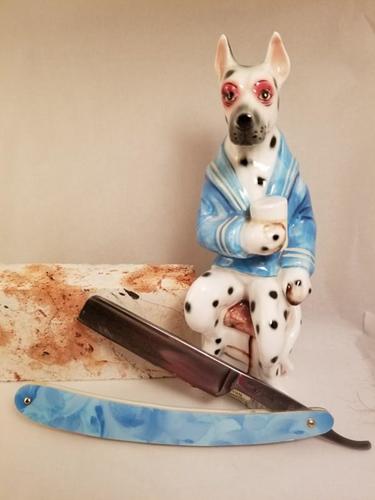
-
12-03-2017, 12:45 AM #11732

I suspect the stuff in question is sizing.
As anyone that wears linen knows linen wrinkles shrinks sags and droops (lacks dimensional stability).
Canvas for painting is often treated with sizing for some of the same reasons.
It (sizing) can be a blend of glue and starch (cooked flour, cornstarch). It can be mixed
with chalk or pigments.
https://en.wikipedia.org/wiki/Sizing
The Trouble with Oil – Preparing a Canvas for Oil Painting
https://en.wikipedia.org/wiki/Gesso
Silverpoint artwork is interesting as a short length of silver wire is used for drawing.
The abrasion of the wire on the prepared board or canvas is close to a pasted strop.
Some chalk is extra fine and polishes a surface (or edge) better than all but the
best modern hones. Perhaps better because most hones are made sharp and
compounded to remove metal more than polish it.
https://www.naturalpigments.com/art-...technique-art/
Pigments... a green pigment is CrOx...
a very common white pigment might be softer and less abrasive
like TiOx https://en.wikipedia.org/wiki/Titanium_dioxide
The most common household sizing is spray starch for the ironing board.
Applying enough following by wiping the surface strongly with a trowel, towel or squeegee could produce
a tight surface for a strop. Diluted white latex paint on the back surface of fabric intended for
a home made strop. Fabric firehose has a bonded internal waterproof hose internal.
The gesso thing is a lot like the Illinois brand strop canvas. Gesso applied from the back in layers
could be the trick for home made strops made from cotton denim (like bluejeans).
Elmer's white or carpenters glue mixed with chalk used in a string line... might be fun to try.
I have not done any of this... in the context of honing or stropping.
Now I am tempted to go and play some more...
I have a dandy home made Tandy leather strop that needs a canvas back half and a
nearby fabric store with nice canvas. Hmmm....
-
-
12-03-2017, 12:50 AM #11733

Wonderful information, thank you for all the links!

~RichardBe yourself; everyone else is already taken.
- Oscar Wilde
-
12-03-2017, 01:31 AM #11734

My friend, I must compliment you on your sense of style. That is a cool color-coordinated razor and pooch and would be fun to see when shaving in the morning!
The only thing I own that could possibly compare is my treasured Avon Collectibles Conquest of Space Beer Stein.
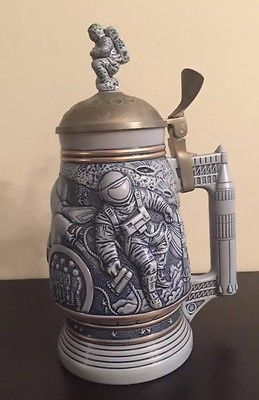
This one isn't mine. I think mine is in the china cabinet in the dining room. But I'll retrieve it if I can just get an Apollo program themed razor!
-
The Following User Says Thank You to jmabuse For This Useful Post:
joamo (12-03-2017)
-
12-03-2017, 03:02 AM #11735
-
12-03-2017, 09:21 PM #11736

You are welcome...
Now I need to explore some of these bits in the specific context of making a great fabric strop.
I suspect the mix used by some is a company secret today and then now lost to time.
A family I grew up operated a cotton fabric mill and my mom was an art teacher so I saw
and heard about some of these things in passing. I can think of a lot of ways to get it wrong.
The reason I spent the time figuring it out is I have some OLD strops where the fabric
side needs work and I have yet found a sane way to soften old crusty strops beyond
rubbing with my finer DMT and rubbing with the spine of a kitchen scraper to worry the
surface.
The last thing I tried was wiping the mud generated from lapping a 10K hone flat
on the strop. It works but I got too much on the strop. I have been scrubbing it clean every two
weeks with water and an old tooth brush. Each time it gets slightly better and
I am continually impressed with the Illinois 827 strop for the price as a result.
-
12-04-2017, 03:15 AM #11737
 horn scale delamination, bleah.
horn scale delamination, bleah.
I got this Wosty Celebrated IXL in a set of broken celluloid scales.
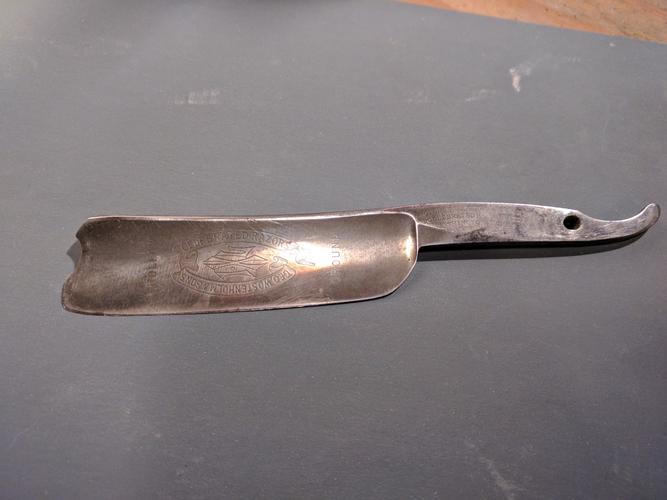
I thought it needed some honey horn scales, so I started from blanks, bandsawed them out oversized, and got this:
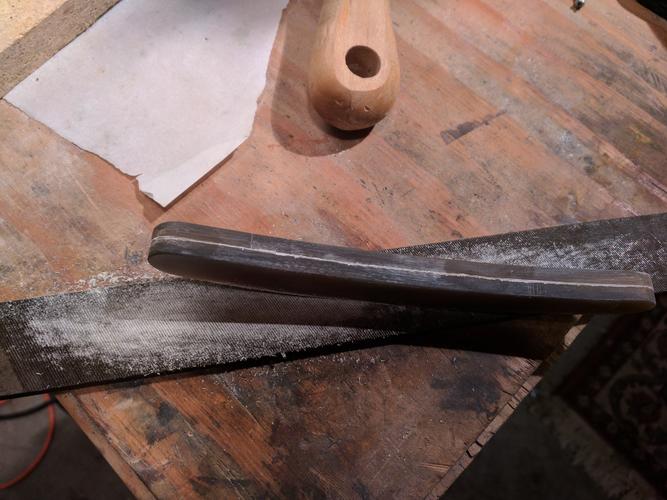
I did some very rough shaping with a file, but everything else I did with hand sanding. Took quite a few hours. And this is what I got:
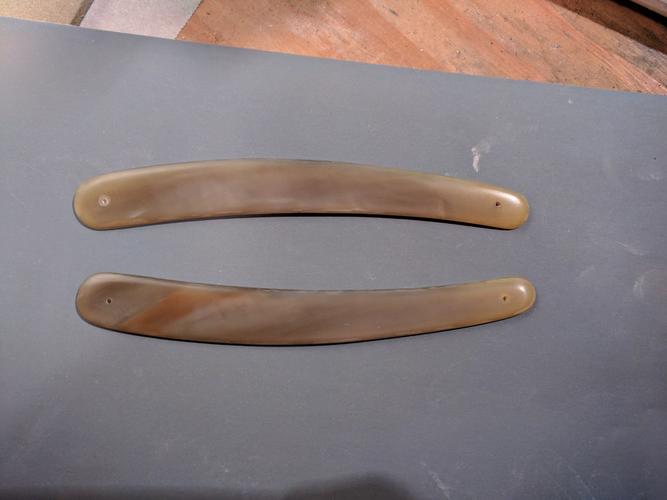
I don't know if you can make it out, but there are light areas in several spots around the edges especially, like on the tang end of the bottom one. That's the horn delaminating a little.
It makes me a little nuts after all the hand sanding. I've never made honey horn scales before, just dark horn ones, so I wouldn't have seen any delamination in those. Is this just to be expected with honey horn? Anything to do about it?
-
12-04-2017, 04:35 AM #11738

Here I've put the original wedge in and some screws to check fit.
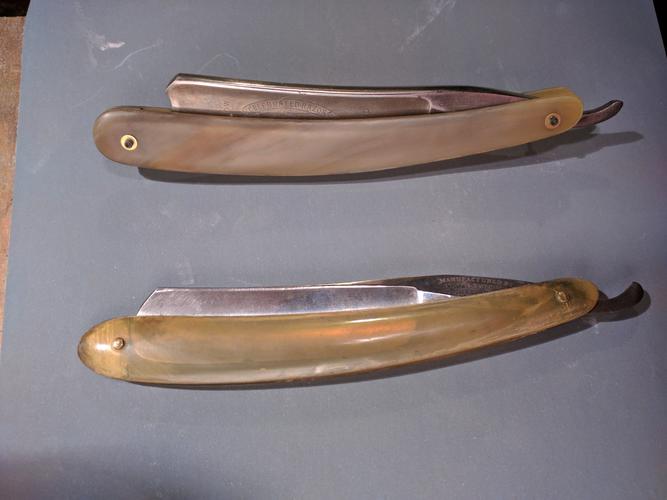
...and ... the scales are too long. I'm going to have to bring the end in some and make another wedge with the pin a little more towards the toe. I used the original broken scales as a template but now I'm thinking they might not have been original, because they were clearly too long. I didn't notice because the blade had come out of them when I got it.
BTW the look I was hoping for is on that big W&B hollow ground underneath. The blade on that guy is longer though, and this horn isn't that transparent. The W&B also has a big chip in the edge (you can just see it through the scales about a third of the way from the toe) which I will work out when I get to cleaning it up soon.
-
12-04-2017, 05:15 AM #11739Senior Member




- Join Date
- Feb 2013
- Location
- Haida Gwaii, British Columbia, Canada
- Posts
- 14,454
Thanked: 4830
Horn is a funny one to work with and I never cut it on the bandsaw. Mostly because I feel that none of the bands I have are really great for cutting it. I mostly try to use the router. I have several aluminum templates I have made, I then attach the horn to the aluminum with double sided tape and use a router bit with a guide bearing and cut the scales that way. Then I put the two rough shaped scales together and use primarily a scraper to shape them.
The last bit of shaping is with 220sandpaper and then I finish them to 1000 grit wet sanding and them buff them. I had a lot of tearing with both my bandsaw and my scroll saw on the sets I tried that way. I still do some roughing on thenscroll saw but I still leave a full 1/8” all the way around before going to the router.
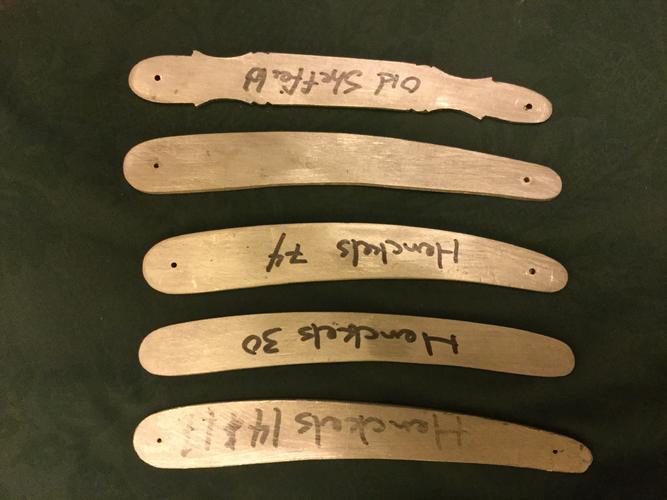 It's not what you know, it's who you take fishing!
It's not what you know, it's who you take fishing!
-
-
12-06-2017, 12:05 AM #11740

Finally! I got a day in a shop, on one I felt capable to do something! Been a long time

Cut and contoured but fitting and finishing will be later.
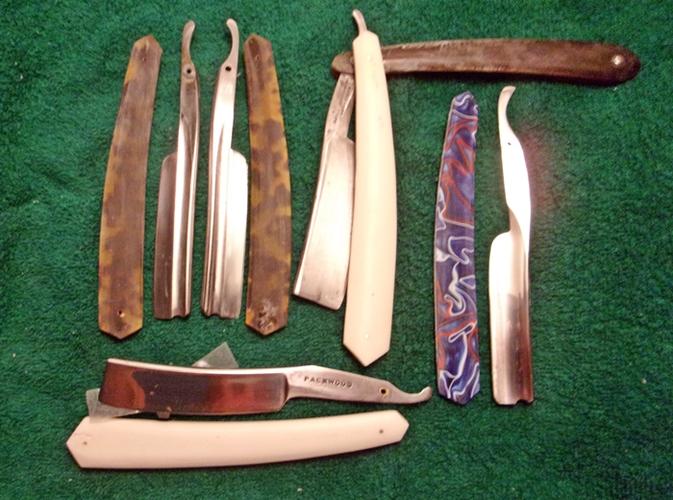
Sometimes the coincidence does work out!
~RichardBe yourself; everyone else is already taken.
- Oscar Wilde
-


 91473Likes
91473Likes LinkBack URL
LinkBack URL About LinkBacks
About LinkBacks






 Reply With Quote
Reply With Quote


